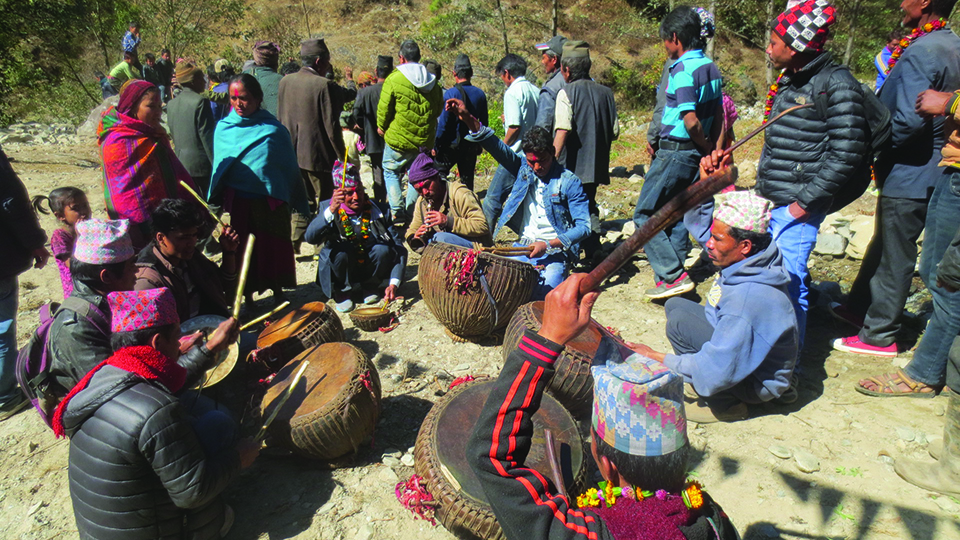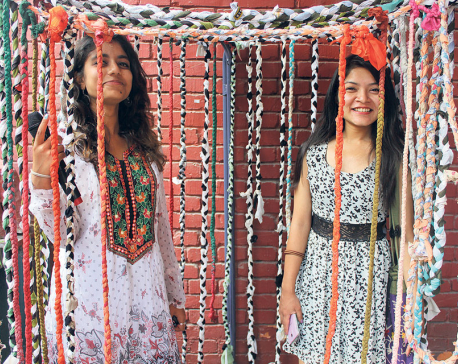
OR
Damai community struggling for livelihood
Published On: February 12, 2018 07:24 AM NPT By: Dinesh Subedi

ROLPA, Feb 12: They have a deep connection with music. They say that they learned it while in their 'mother's womb'. Children from poor and marginalized families of Damai community in the remote villages of Rolpa follow their traditional occupation of playing traditional musical instruments during social occasions instead of going to school. Playing music pays them off, while education 'only increases their expenses', they parents claim.
Apart from playing musical instruments, they also have adopted another traditional occupation of tailoring. “I cannot afford to send children to school. It costs too much for us. We are very poor,” said Kaman Singh Pariyar of Dawang, Rolpa Municipality. “I did not go to school but learned what my forefathers did. Even our children are doing the same work,” he added.
Not sending children to school does not seem to bother the locals of Dawang much. What bothers them more is the shrinking prospects of their occupation. Only a very few of the villagers approach them for stitching clothes these days. Their trade is endangered by the availability of cheap readymade clothes. Even playing traditional music during the wedding and other cultural ceremonies are getting less common.
“Future of our traditional occupations is in danger. If this continues, soon we will be out of the job,” Pariyar said sounding anxious. The Pariyars do not have their own land. In lack of land, many are deprived of citizenship certificates and other state facilities.
“We are still deprived of state facilities. We never owned land and have always worked for landlords. Despite several Dalit movements across the country and change of governments, our plight remains the same,” Pariyar stated.
We have still deprived of state facilities. We never owned land and have always worked for landlords. Despite several Dalit movements across the country and change of governments, our plight remains the same,” -
Kaman Singh Pariyar, Dawang, Rolpa
“We feel that we are only used by the society because despite taking our services, our role in the society has not been recognized. Our services are required in all cultural and religious functions,” Pariyar narrated. “But then, we are considered low caste and deprived of many essential things. In lack of our own land, we are forced to make them happy instead of starting something of our own to earn a living,” he added.
Pariyar has been playing traditional music for the last three decades. His sons and his grandsons learned it from him. Some of his sons work in India. However, they do not send many remittances back home and the family still lives in poverty.
Daughters work in kiln factories
While male child often follows the occupation of the father, daughters of this community are sent to work in kiln factories of late. Many of the Dalit children from Rolpa are working in kiln factories in Kathmandu and elsewhere.
Even though the government has banned child labor, neither the government monitors their engagement nor the families back in Rolpa are interested to get the girls back. According to Pariyar, almost every parent in Rolpa from his community are eager to send off their girl child to work in town.
“Education is a dream for our children. Due to lack of means, we feel better off if our children start earning as early as possible. This is how it is here,” he said.
However, if the government could provide social security schemes that could provide income generation opportunities, they could perhaps think of sending children to school, he believes.
“When you are struggling for two square meals for your children, you send them away when there is an opportunity that will provide them at least two meals a day,” he said adding that he also wishes to send his children to school.
'Drinking makes us equal'
While sheer caste discrimination leaves them humiliated and youths are even more intolerant about it, something seems to have comforted them. 'High caste people drink alcohol too'.
This very habit of consuming alcohol, which is quite common in the villages of Rolpa, 'makes the so-called high caste people and us equal', they argue. According to a teenager Irkhe Pariyar, only alcohol bridges the gap.
“They are the drunkard. We are the drunkard. We are same,” he noted. “They take drinks with meat and other snacks, but as we cannot afford, we drink it neat,” he added.
Irkhe further said that the youths like him don't have a job in the village. Those who have left home for work outside are not doing well either. “We do have energy and willpower to work and earn for our family but there are no opportunities here. As we don't have land, we can't even do farming,” he stated.
You May Like This

Community school teachers must admit their children in community schools
SYANGJA, April 10: The Chapakot Municipality in Syangja district has decided not to release the salaries of community schools' teachers... Read More...

Art for community, with community
KATHMANDU: Art exhibition, created during Community Art workshop ‘Rebuilding Recaptured’ held at Sindhupalchowk, was organized on Saturday at NexUs Culture... Read More...

Election is top priority: Govt tells int’l community
KATHMANDU, Feb 1: The government has informed the international community that its priority is to hold elections at the earliest in... Read More...







Just In
- NRB to provide collateral-free loans to foreign employment seekers
- NEB to publish Grade 12 results next week
- Body handover begins; Relatives remain dissatisfied with insurance, compensation amount
- NC defers its plan to join Koshi govt
- NRB to review microfinance loan interest rate
- 134 dead in floods and landslides since onset of monsoon this year
- Mahakali Irrigation Project sees only 22 percent physical progress in 18 years
- Singapore now holds world's most powerful passport; Nepal stays at 98th











Leave A Comment